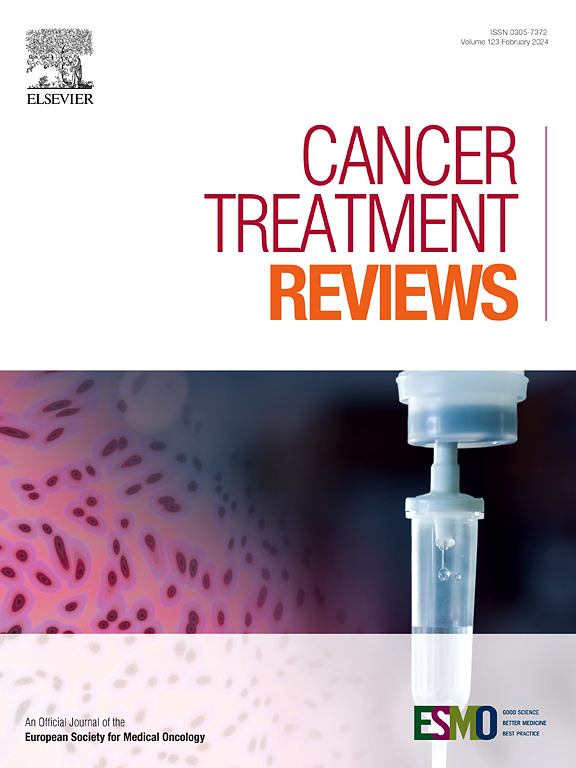实施中间临床终点:前列腺癌管理试验的实用框架
IF 9.6
1区 医学
Q1 ONCOLOGY
引用次数: 0
摘要
尽管治疗取得了进步,但前列腺癌对大多数患者来说仍然是致命的。新疗法的加速发展需要经过验证的替代终点,以避免III期试验中延长的生存期随访。本综述系统地评估了前列腺癌的中间临床终点(ICEs),以建立方法学上可靠的替代总生存期(OS)的方法。我们首先合成了ICE验证的方法学标准。随后的分析包括转移性去势敏感(mCSPC)和耐药前列腺癌(mCRPC)的III期试验(PubMed/Web of Science, 2025年1月),要求:随机化,治疗干预,OS作为主要/共同主要终点,≥1 ICE(放射学无进展生存期(rPFS),里程碑生存期),≥70名参与者。通过两阶段meta分析对代孕进行量化,R2≥0.7定义效度。无转移生存期(MFS)在局部疾病中得到验证,实现了试验终点替代。在晚期,ice的证据仍然严重缺乏。我们的分析确定mCSPC和mCRPC的里程碑生存期是一个有希望的ICE候选者,表明与OS有很强的试验水平相关性。目前前列腺癌的ICE验证不成比例地集中于局部疾病,使晚期治疗发展受到限制。虽然里程碑生存期显示了替代的潜力,但即使在严格设计的试验中,终点验证在方法上仍然具有挑战性。这项工作强调了通过统一的方法框架和协作的交叉试验分析加速ICE标准化的必要性。本文章由计算机程序翻译,如有差异,请以英文原文为准。

Operationalizing intermediate clinical endpoints: A pragmatic framework for prostate cancer management trials
Despite therapeutic advances, prostate cancer remains lethal for most patients. Accelerated development of novel therapies requires validated surrogate endpoints to circumvent prolonged survival follow-up in phase III trials. This review systematically evaluates intermediate clinical endpoints (ICEs) in prostate cancer to establish methodologically robust alternatives to overall survival (OS). We first synthesized methodological standards for ICE validation. Subsequent analysis encompassed phase III trials (PubMed/Web of Science, Jan. 2025) in metastatic castration-sensitive (mCSPC) and –resistant prostate cancer (mCRPC), requiring: randomization, therapeutic intervention, OS as primary/co-primary endpoint, ≥1 ICE (radiographic progression-free survival (rPFS), milestone survival), and ≥70 participants. Surrogacy was quantified via two-stage meta-analysis, with R2 ≥ 0.7 defining validity. Metastasis-free survival (MFS) is validated for localized disease, enabling trial endpoint substitution. In advanced stages, evidence for ICEs remains critically deficient. Our analysis identifies milestone survival as a promising ICE candidate in mCSPC and mCRPC, demonstrating strong trial-level correlation with OS. Current ICE validation in prostate cancer is disproportionately focused on localized disease, leaving advanced-stage therapeutic development constrained. While milestone survival shows surrogacy potential, endpoint validation remains methodologically challenging even in rigorously designed trials. This work underscores the imperative to accelerate ICE standardization through unified methodological frameworks and collaborative cross-trial analyses.
求助全文
通过发布文献求助,成功后即可免费获取论文全文。
去求助
来源期刊

Cancer treatment reviews
医学-肿瘤学
CiteScore
21.40
自引率
0.80%
发文量
109
审稿时长
13 days
期刊介绍:
Cancer Treatment Reviews
Journal Overview:
International journal focused on developments in cancer treatment research
Publishes state-of-the-art, authoritative reviews to keep clinicians and researchers informed
Regular Sections in Each Issue:
Comments on Controversy
Tumor Reviews
Anti-tumor Treatments
New Drugs
Complications of Treatment
General and Supportive Care
Laboratory/Clinic Interface
Submission and Editorial System:
Online submission and editorial system for Cancer Treatment Reviews
 求助内容:
求助内容: 应助结果提醒方式:
应助结果提醒方式:


